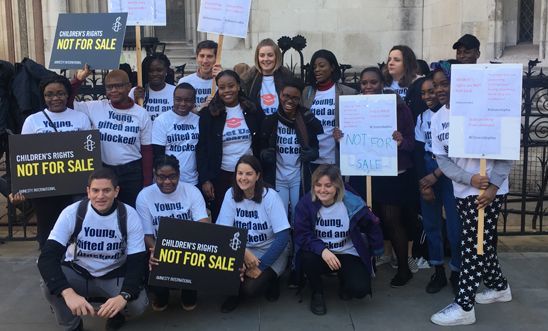
We Are All Born Free

The United Nations Convention on the Rights of the Child (UNCRC) sets out the civil, political, economic, social and cultural rights of children (defined as under 18 year olds) and is a particularly important piece of international law. In most countries, children have limited if any democratic rights. They can’t vote and can rarely participate in the decisions that impact on them the most. So its particularly important that with limited power, their rights are protected in law.
This November we see the anniversary of the UNCRC. This international treaty was adopted by the UN General Assembly on the 20 November 1989 and Amnesty International played a role in drafting the Convention.
Only one country – the USA – has not signed and ratified the UNCRC, so it is a treaty with a huge amount of international support. It includes such rights as being protected from exploitation such as being used as child soldiers or in child labour, the right to have parents or guardians care for them, it forbids the death penalty for children and secures the rights to education and play.
The UK ratified the UNCRC in December 1991 but it has never become part of our domestic law. When the UK signs a treaty, it needs legislation to be passed domestically to make the content of the treaty legally binding. In Wales, the Welsh Government has partly made it part of their laws. Welsh Ministers need to have “due regard” to the rights within the UNCRC when they are making new laws or policies that impact on children.
But what can children do when their rights are violated in the UK? In some circumstances, they can use the Human Rights Act to claim their rights. But the UNCRC is an international treaty specifically designed for children and their families and although it can be referred to in court cases in the UK, it’s not legally binding and can be dismissed by judges.
The Scottish Government has just held a consultation on making the UNCRC part of Scots Law. This could mean that not only should children’s rights be considered in all future laws and policies (similar to in Wales) but also that children and their families could go to court to enforce their rights if they are violated; by their school, a health board or the Scottish Government.
This could potentially help children and young people access education or health care where they are being blocked due to having learning difficulties or a disability. Or where children are made homeless due to their parents’ economic situation or immigration status. It could revolutionise the way children’s rights are considered when public bodies or local authorities are developing housing or policing policies.
Amnesty International have joined with children’s rights organisations across Scotland to call for a “gold standard” piece of legislation to make the UN Convention on the Rights of the Child part of our law in Scotland. And when the legislation is introduced, hopefully in time for the Convention’s anniversary in November, we will be pushing to make sure it brings in the highest standards possible for access to justice and the realisation of children’s rights.
This is an incredible opportunity for human rights in Scotland. Bringing the UNCRC into Scots Law is only the first step, we want to see ALL the human rights treaties that the UK has signed - including those that cover economic, social and cultural rights, women’s rights, rights of people with disabilities, that prohibits racial discrimination, the ban on torture and others – made legally enforceable in Scotland and across the UK.
If we get it right for children, we can get it right for other groups and other sets of rights, making Scotland a world leader in human rights law.
While we wait for the outcome of the consultation, Amnesty activists are continuing to push the UK Government to ratify the newest Optional Protocol to the Convention. This would enable children who have had their rights violated, and have been unable to get justice in domestic courts, to take their case to the UN for consideration. You can learn more and sign up to that campaign here: https://www.amnesty.org.uk/blogs/childrens-human-rights-network-blog/if-rights-cant-be-enforced-are-they-really-rights
And join the Amnesty International Children’s Human Rights Network here: https://www.amnesty.org.uk/join-our-childrens-human-rights-network
You can read our submission to the Scottish Government’s consultation on the incorporation of the UNCRC below.
Our blogs are written by Amnesty International staff, volunteers and other interested individuals, to encourage debate around human rights issues. They do not necessarily represent the views of Amnesty International.
0 comments